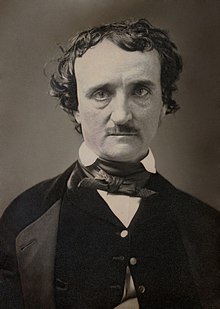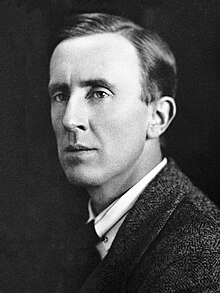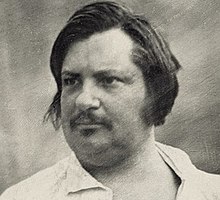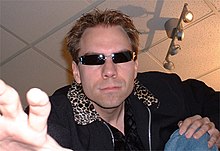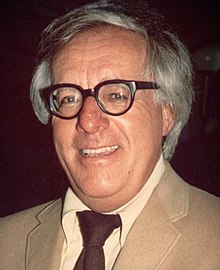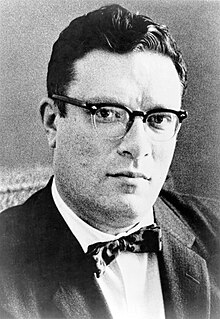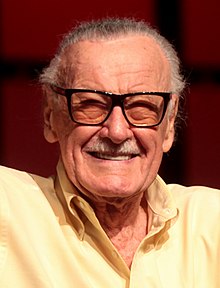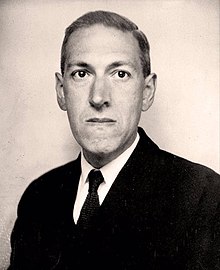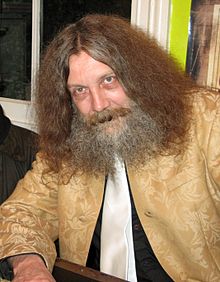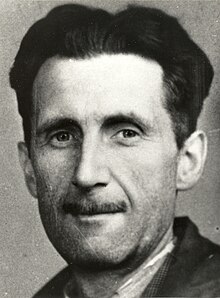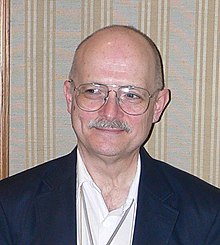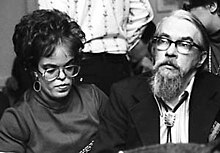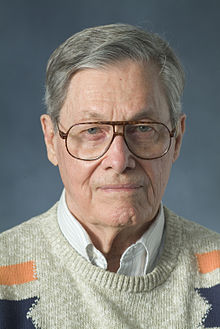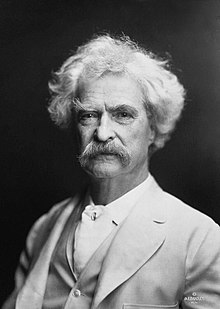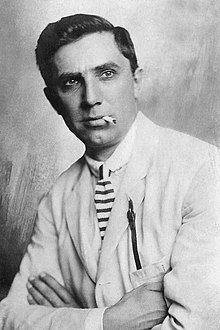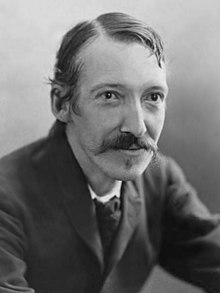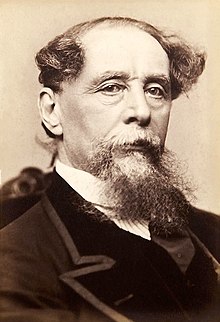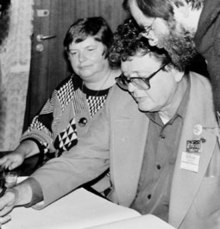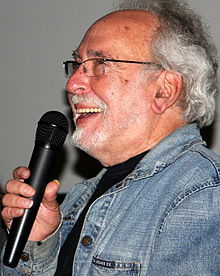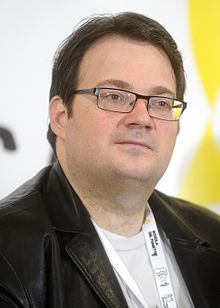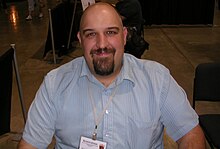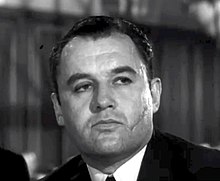Portal:Speculative fiction/Selected biography
This is a listing of all biographies for the speculative fiction portal as of 11 May 2022.
Rudolph Cartier (born Rudolph Kacser, renamed himself in Germany to Rudolph Katscher; 17 April 1904 – 7 June 1994) was an Austrian television director, filmmaker, screenwriter and producer who worked predominantly in British television, exclusively for the BBC. He is best known for his 1950s collaborations with screenwriter Nigel Kneale, most notably the Quatermass serials and their 1954 adaptation of George Orwell's dystopian novel Nineteen Eighty-Four.
After studying architecture and then drama, Cartier began his career as a screenwriter and then film director in Berlin, working for UFA Studios. After a brief spell in the United States he moved to the United Kingdom in 1935. Initially failing to gain a foothold in the British film industry, he began working for BBC Television in the late 1930s (among other productions he was involved in the making of Rehearsal for a Drama, BBC 1939). The outbreak of war, however, meant that his contract was terminated; his television play The Dead Eye was stopped in the production stage. After the war, he occasionally worked for British films before he was again hired by the BBC in 1952. He soon became one of the public service broadcaster's leading directors and went on to produce and direct over 120 productions in the next 24 years, ending his television career with the play Loyalties in 1976. (Full article...)
Alfred Tennyson, 1st Baron Tennyson FRS (/ˈtɛnɪsən/; 6 August 1809 – 6 October 1892) was an English poet. He was the Poet Laureate during much of Queen Victoria's reign. In 1829, Tennyson was awarded the Chancellor's Gold Medal at Cambridge for one of his first pieces, "Timbuktu". He published his first solo collection of poems, Poems, Chiefly Lyrical, in 1830. "Claribel" and "Mariana", which remain some of Tennyson's most celebrated poems, were included in this volume. Although described by some critics as overly sentimental, his poems ultimately proved popular and brought Tennyson to the attention of well-known writers of the day, including Samuel Taylor Coleridge. Tennyson's early poetry, with its medievalism and powerful visual imagery, was a major influence on the Pre-Raphaelite Brotherhood.
Tennyson also focused on short lyrics, such as "Break, Break, Break", "The Charge of the Light Brigade", "Tears, Idle Tears", and "Crossing the Bar". Much of his verse was based on classical mythological themes, such as "Ulysses" and "The Lotos-Eaters". "In Memoriam A.H.H." was written to commemorate his friend Arthur Hallam, a fellow poet and student at Trinity College, Cambridge, after he died of a stroke at the age of 22. Tennyson also wrote notable blank verse, including Idylls of the King, "Ulysses", and "Tithonus". During his career, Tennyson attempted drama, but his plays enjoyed little success. (Full article...)
Edgar Allan Poe (né Edgar Poe; January 19, 1809 – October 7, 1849) was an American writer, poet, editor, and literary critic who is best known for his poetry and short stories, particularly his tales involving mystery and the macabre. He is widely regarded as one of the central figures of Romanticism and Gothic fiction in the United States and of early American literature. Poe was one of the country's first successful practitioners of the short story, and is generally considered to be the inventor of the detective fiction genre. In addition, he is credited with contributing significantly to the emergence of science fiction. He is the first well-known American writer to earn a living by writing alone, which resulted in a financially difficult life and career.
Poe was born in Boston. He was the second child of actors David and Elizabeth "Eliza" Poe. His father abandoned the family in 1810, and when Eliza died the following year, Poe was taken in by John and Frances Allan of Richmond, Virginia. They never formally adopted him, but he lived with them well into young adulthood. Poe attended the University of Virginia but left after only a year due to a lack of money. He frequently quarreled with John Allan over the funds needed to continue his education as well as his gambling debts. In 1827, having enlisted in the United States Army under the assumed name of Edgar A. Perry, he published his first collection, Tamerlane and Other Poems, which was credited only to "a Bostonian". Poe and Allan reached a temporary rapprochement after the death of Allan's wife, Frances, in 1829. However, Poe later failed as an officer cadet at West Point, declared his intention to become a writer, primarily of poems, and parted ways with Allan. (Full article...)
William Ford Gibson (born March 17, 1948) is an American-Canadian speculative fiction writer and essayist widely credited with pioneering the science fiction subgenre known as cyberpunk. Beginning his writing career in the late 1970s, his early works were noir, near-future stories that explored the effects of technology, cybernetics, and computer networks on humans, a "combination of lowlife and high tech"—and helped to create an iconography for the Information Age before the ubiquity of the Internet in the 1990s. Gibson coined the term "cyberspace" for "widespread, interconnected digital technology" in his short story "Burning Chrome" (1982), and later popularized the concept in his acclaimed debut novel Neuromancer (1984). These early works of Gibson's have been credited with "renovating" science fiction literature in the 1980s.
After expanding on the story in Neuromancer with two more novels (Count Zero in 1986 and Mona Lisa Overdrive in 1988), thus completing the dystopic Sprawl trilogy, Gibson collaborated with Bruce Sterling on the alternate history novel The Difference Engine (1990), which became an important work of the science fiction subgenre known as steampunk. (Full article...)
William Denby "Bill" Hanna (July 14, 1910 – March 22, 2001) was an American animator, voice actor, and occasional musician who is best known for co-creating Tom and Jerry and providing the vocal effects for the series' title characters. Alongside Joseph Barbera, he also founded the animation studio and production company Hanna-Barbera.
Hanna joined the Harman and Ising animation studio in 1930 and steadily gained skill and prominence while working on cartoons such as Captain and the Kids. In 1937, while working at Metro-Goldwyn-Mayer (MGM), Hanna met Joseph Barbera. In 1957, they co-founded Hanna-Barbera, which became the most successful television animation studio in the business, creating or producing programs such as The Flintstones, The Huckleberry Hound Show, The Jetsons, Scooby-Doo, The Smurfs, and Yogi Bear. In 1967, Hanna-Barbera was sold to Taft Broadcasting for $12 million, but Hanna and Barbera remained heads of the company until 1991. At that time, the studio was sold to Turner Broadcasting System, which in turn was merged with Time Warner in 1996; Hanna and Barbera stayed on as advisors. (Full article...)

Mary Wollstonecraft Shelley (UK: /ˈwʊlstənkrɑːft/ WUUL-stən-krahft, US: /-kræft/ -kraft; née Godwin; 30 August 1797 – 1 February 1851) was an English novelist who wrote the Gothic novel Frankenstein; or, The Modern Prometheus (1818), which is considered an early example of science fiction. She also edited and promoted the works of her husband, the Romantic poet and philosopher Percy Bysshe Shelley. Her father was the political philosopher William Godwin and her mother was the philosopher and women's rights advocate Mary Wollstonecraft.
Mary's mother died 11 days after giving birth to her. She was raised by her father, who provided her with a rich informal education, encouraging her to adhere to his own anarchist political theories. When she was four, her father married a neighbour, Mary Jane Clairmont, with whom Mary had a troubled relationship. (Full article...)
John Ronald Reuel Tolkien (/ˈruːl ˈtɒlkiːn/, 3 January 1892 – 2 September 1973) was an English writer and philologist. He was the author of the high fantasy works The Hobbit and The Lord of the Rings.
From 1925 to 1945, Tolkien was the Rawlinson and Bosworth Professor of Anglo-Saxon and a Fellow of Pembroke College, both at the University of Oxford. He then moved within the same university to become the Merton Professor of English Language and Literature and Fellow of Merton College, and held these positions from 1945 until his retirement in 1959. Tolkien was a close friend of C. S. Lewis, a co-member of the informal literary discussion group The Inklings. He was appointed a Commander of the Order of the British Empire by Queen Elizabeth II on 28 March 1972. (Full article...)
Joanne Rowling (/ˈroʊlɪŋ/ ⓘ ROH-ling; born 31 July 1965), known by her pen name J. K. Rowling, is a British author and philanthropist. She is the author of Harry Potter, a seven-volume fantasy novel series published from 1997 to 2007. The series has sold over 600 million copies, been translated into 84 languages, and spawned a global media franchise including films and video games. The Casual Vacancy (2012) was her first novel for adults. She writes Cormoran Strike, an ongoing crime fiction series, under the alias Robert Galbraith.
Born in Yate, Gloucestershire, Rowling was working as a researcher and bilingual secretary for Amnesty International in 1990 when she conceived the idea for the Harry Potter series. The seven-year period that followed saw the death of her mother, the birth of her first child, divorce from her first husband, and relative poverty until the first novel in the series, Harry Potter and the Philosopher's Stone, was published in 1997. Six sequels followed, concluding with Harry Potter and the Deathly Hallows (2007). By 2008, Forbes had named her the world's highest-paid author. (Full article...)
Honoré de Balzac (/ˈbælzæk/ BAL-zak, more commonly US: /ˈbɔːl-/ BAWL-; French: [ɔnɔʁe d(ə) balzak]; born Honoré Balzac; 20 May 1799 – 18 August 1850) was a French novelist and playwright. The novel sequence La Comédie humaine, which presents a panorama of post-Napoleonic French life, is generally viewed as his magnum opus.
Owing to his keen observation of detail and unfiltered representation of society, Balzac is regarded as one of the founders of realism in European literature. He is renowned for his multi-faceted characters; even his lesser characters are complex, morally ambiguous and fully human. Inanimate objects are imbued with character as well; the city of Paris, a backdrop for much of his writing, takes on many human qualities. His writing influenced many famous writers, including the novelists Émile Zola, Charles Dickens, Marcel Proust, Gustave Flaubert, and Henry James, and filmmakers François Truffaut and Jacques Rivette. Many of Balzac's works have been made into films and continue to inspire other writers. James called him "really the father of us all." (Full article...)
Frank Klepacki (/kləˈpæki/; Polish: [klɛˈpat͡skʲi]) is an American musician and video game composer, best known for his work on the Command & Conquer series. Having learned to play drums as a child, he joined Westwood Studios as a composer when he was 17 years old. He has scored several games there, including the Lands of Lore series, Westwood Studios' Dune games, The Legend of Kyrandia series, Blade Runner, and the Command & Conquer series. His work in Command & Conquer: Red Alert won two awards.
He lives in Las Vegas, where he has shaped a solo career and played and produced for several local bands. His personal and band work touches upon several genres, including orchestral, rock music, hip hop music, soul music, and funk. He has dubbed the style of music he writes as "Rocktronic". His work has appeared in various media, including the Spike TV program The Ultimate Fighter. (Full article...)
Johannes Kepler (/ˈkɛplər/; German: [joˈhanəs ˈkɛplɐ, -nɛs -] ⓘ; 27 December 1571 – 15 November 1630) was a German astronomer, mathematician, astrologer, natural philosopher and writer on music. He is a key figure in the 17th-century Scientific Revolution, best known for his laws of planetary motion, and his books Astronomia nova, Harmonice Mundi, and Epitome Astronomiae Copernicanae, influencing among others Isaac Newton, providing one of the foundations for his theory of universal gravitation. The variety and impact of his work made Kepler one of the founders and fathers of modern astronomy, the scientific method, natural and modern science. He has been described as the "father of science fiction" for his novel Somnium.
Kepler was a mathematics teacher at a seminary school in Graz, where he became an associate of Prince Hans Ulrich von Eggenberg. Later he became an assistant to the astronomer Tycho Brahe in Prague, and eventually the imperial mathematician to Emperor Rudolf II and his two successors Matthias and Ferdinand II. He also taught mathematics in Linz, and was an adviser to General Wallenstein.
Additionally, he did fundamental work in the field of optics, being named the father of modern optics, in particular for his Astronomiae pars optica. He also invented an improved version of the refracting telescope, the Keplerian telescope, which became the foundation of the modern refracting telescope, while also improving on the telescope design by Galileo Galilei, who mentioned Kepler's discoveries in his work. (Full article...)
Robert Ervin Howard (January 22, 1906 – June 11, 1936) was an American writer who wrote pulp fiction in a diverse range of genres. He created the character Conan the Barbarian and is regarded as the father of the sword and sorcery subgenre.
Howard was born and raised in Texas. He spent most of his life in the town of Cross Plains, with some time spent in nearby Brownwood. A bookish and intellectual child, he was also a fan of boxing, eventually taking up amateur boxing, and spent some time in his late teens bodybuilding. From the age of nine, he longed to become a writer of adventure fiction but did not have real success until he was 23. Thereafter, until his death by suicide at age 30, Howard's writings were published in a wide selection of magazines, journals, and newspapers, and he became proficient in several subgenres. His greatest success occurred after his death. (Full article...)
Ray Douglas Bradbury (US: /ˈbrædbɛri/ BRAD-berr-ee; August 22, 1920 – June 5, 2012) was an American author and screenwriter. One of the most celebrated 20th-century American writers, he worked in a variety of genres, including fantasy, science fiction, horror, mystery, and realistic fiction.
Bradbury is best known for his novel Fahrenheit 451 (1953) and his short-story collections The Martian Chronicles (1950), The Illustrated Man (1951), and The October Country (1955). Other notable works include the coming of age novel Dandelion Wine (1957), the dark fantasy Something Wicked This Way Comes (1962) and the fictionalized memoir Green Shadows, White Whale (1992). He also wrote and consulted on screenplays and television scripts, including Moby Dick and It Came from Outer Space. Many of his works were adapted into television and film productions as well as comic books. Bradbury also wrote poetry which has been published in several collections, such as They Have Not Seen the Stars (2001). (Full article...)
Isaac Asimov (/ˈæzɪmɒv/ AZ-im-ov; c. January 2, 1920 – April 6, 1992) was an American writer and professor of biochemistry at Boston University. During his lifetime, Asimov was considered one of the "Big Three" science fiction writers, along with Robert A. Heinlein and Arthur C. Clarke. A prolific writer, he wrote or edited more than 500 books. He also wrote an estimated 90,000 letters and postcards. Best known for his hard science fiction, Asimov also wrote mysteries and fantasy, as well as popular science and other non-fiction.
Asimov's most famous work is the Foundation series, the first three books of which won the one-time Hugo Award for "Best All-Time Series" in 1966. His other major series are the Galactic Empire series and the Robot series. The Galactic Empire novels are set in the much earlier history of the same fictional universe as the Foundation series. Later, with Foundation and Earth (1986), he linked this distant future to the Robot series, creating a unified "future history" for his works. He also wrote more than 380 short stories, including the social science fiction novelette "Nightfall", which in 1964 was voted the best short science fiction story of all time by the Science Fiction Writers of America. Asimov wrote the Lucky Starr series of juvenile science-fiction novels using the pen name Paul French. (Full article...)
Robert Silverberg (born January 15, 1935) is a prolific American science fiction author and editor. He is a multiple winner of both Hugo and Nebula Awards, a member of the Science Fiction and Fantasy Hall of Fame, and a Grand Master of SF since 2004.
Especially noted Silverberg works include the novella Nightwings (1969) and the novels Downward to the Earth (1970), The World Inside (1971), Dying Inside (1972), and Lord Valentine's Castle (1980; the first of the Majipoor series). (Full article...)

Paul Myron Anthony Linebarger (July 11, 1913 – August 6, 1966), better known by his pen-name Cordwainer Smith, was an American author known for his science fiction works. Linebarger was a US Army officer, a noted East Asia scholar, and an expert in psychological warfare. Although his career as a writer was shortened by his death at the age of 53, he is considered one of science fiction's more talented and influential authors. (Full article...)
Alfred Bester (December 18, 1913 – September 30, 1987) was an American science fiction author, TV and radio screenwriter, magazine editor and scriptwriter for comics. He is best remembered for his science fiction, including The Demolished Man, winner of the inaugural Hugo Award in 1953. Science fiction author Harry Harrison wrote, "Alfred Bester was one of the handful of writers who invented modern science fiction." (Full article...)
Stanisław Herman Lem (Polish: [staˈɲiswaf ˈlɛm] ⓘ; 12 September 1921 – 27 March 2006) was a Polish writer. He was the author of many novels, short stories, and essays on various subjects, including philosophy, futurology, and literary criticism. Many of his science fiction stories are of satirical and humorous character. Lem's books have been translated into more than 50 languages and have sold more than 45 million copies. Worldwide, he is best known as the author of the 1961 novel Solaris. In 1976 Theodore Sturgeon wrote that Lem was the most widely read science fiction writer in the world.
Lem was the author of the fundamental philosophical work Summa Technologiae, in which he anticipated the creation of virtual reality, artificial intelligence, and also developed the ideas of human autoevolution, the creation of artificial worlds, and many others. Lem's science fiction works explore philosophical themes through speculations on technology, the nature of intelligence, the impossibility of communication with and understanding of alien intelligence, despair about human limitations, and humanity's place in the universe. His essays and philosophical books cover these and many other topics. Translating his works is difficult due to Lem's elaborate neologisms and idiomatic wordplay. (Full article...)
John Wood Campbell Jr. (June 8, 1910 – July 11, 1971) was an American science fiction writer and editor. He was editor of Astounding Science Fiction (later called Analog Science Fiction and Fact) from late 1937 until his death and was part of the Golden Age of Science Fiction. Campbell wrote super-science space opera under his own name and stories under his primary pseudonym, Don A. Stuart. Campbell also used the pen names Karl Van Kampen and Arthur McCann. His novella Who Goes There? was adapted as the films The Thing from Another World (1951), The Thing (1982), and The Thing (2011).
Campbell began writing science fiction at age 18 while attending MIT. He published six short stories, one novel, and eight letters in the science fiction magazine Amazing Stories from 1930 to 1931. This work established Campbell's reputation as a writer of space adventure. When in 1934 he began to write stories with a different tone, he wrote as Don A. Stuart. From 1930 until 1937, Campbell was prolific and successful under both names; he stopped writing fiction shortly after he became editor of Astounding in 1937. In his capacity as an editor, Campbell published some of the very earliest work, and helped shape the careers of virtually every important science-fiction author to debut between 1938 and 1946, including Isaac Asimov, Robert A. Heinlein, Theodore Sturgeon, and Arthur C. Clarke. (Full article...)

Alfred Elton van Vogt (/væn voʊt/ VAN VOHT; April 26, 1912 – January 26, 2000) was a Canadian-born American science fiction writer. His fragmented, bizarre narrative style influenced later science fiction writers, notably Philip K. Dick. He was one of the most popular and influential practitioners of science fiction in the mid-twentieth century, the genre's so-called Golden Age, and one of the most complex. The Science Fiction Writers of America named him their 14th Grand Master in 1995 (presented 1996). (Full article...)
Roger Joseph Zelazny (May 13, 1937 – June 14, 1995) was an American fantasy and science fiction writer known for his short stories and novels, best known for The Chronicles of Amber. He won the Nebula Award three times (out of 14 nominations) and the Hugo Award six times (also out of 14 nominations), including two Hugos for novels: the serialized novel ...And Call Me Conrad (1965), subsequently published under the title This Immortal (1966), and the novel Lord of Light (1967). (Full article...)
Sir Arthur Charles Clarke CBE FRAS (16 December 1917 – 19 March 2008) was a British science fiction writer, science writer, futurist, inventor, undersea explorer, and television series host.
He co-wrote the screenplay for the 1968 film 2001: A Space Odyssey, widely regarded as one of the most influential films of all time. Clarke was a science fiction writer, an avid populariser of space travel, and a futurist of distinguished ability. He wrote many books and many essays for popular magazines. In 1961, he received the Kalinga Prize, a UNESCO award for popularising science. Clarke's science and science fiction writings earned him the moniker "Prophet of the Space Age". His science fiction writings in particular earned him a number of Hugo and Nebula awards, which along with a large readership, made him one of the towering figures of the genre. For many years Clarke, Robert Heinlein, and Isaac Asimov were known as the "Big Three" of science fiction. (Full article...)
Robert Anson Heinlein (/ˈhaɪnlaɪn/ HYNE-lyne; July 7, 1907 – May 8, 1988) was an American science fiction author, aeronautical engineer, and naval officer. Sometimes called the "dean of science fiction writers", he was among the first to emphasize scientific accuracy in his fiction, and was thus a pioneer of the subgenre of hard science fiction. His published works, both fiction and non-fiction, express admiration for competence and emphasize the value of critical thinking. His plots often posed provocative situations which challenged conventional social mores. His work continues to have an influence on the science-fiction genre, and on modern culture more generally.
Heinlein became one of the first American science-fiction writers to break into mainstream magazines such as The Saturday Evening Post in the late 1940s. He was one of the best-selling science-fiction novelists for many decades, and he, Isaac Asimov, and Arthur C. Clarke are often considered the "Big Three" of English-language science fiction authors. Notable Heinlein works include Stranger in a Strange Land, Starship Troopers (which helped mold the space marine and mecha archetypes) and The Moon Is a Harsh Mistress. His work sometimes had controversial aspects, such as plural marriage in The Moon Is a Harsh Mistress, militarism in Starship Troopers and technologically competent women characters who were formidable, yet often stereotypically feminine—such as Friday. (Full article...)
Jules Gabriel Verne (/vɜːrn/; French: [ʒyl ɡabʁijɛl vɛʁn]; 8 February 1828 – 24 March 1905) was a French novelist, poet and playwright.
His collaboration with the publisher Pierre-Jules Hetzel led to the creation of the Voyages extraordinaires, a series of bestselling adventure novels including Journey to the Center of the Earth (1864), Twenty Thousand Leagues Under the Seas (1870), and Around the World in Eighty Days (1872). His novels, always well-researched according to the scientific knowledge then available, are generally set in the second half of the 19th century, taking into account the technological advances of the time. (Full article...)
Herbert George Wells (21 September 1866 – 13 August 1946) was an English writer, prolific in many genres. He wrote more than fifty novels and dozens of short stories. His non-fiction output included works of social commentary, politics, history, popular science, satire, biography, and autobiography. Wells' science fiction novels are so well regarded that he has been called the "father of science fiction".
In addition to his fame as a writer, he was prominent in his lifetime as a forward-looking, even prophetic social critic who devoted his literary talents to the development of a progressive vision on a global scale. As a futurist, he wrote a number of utopian works and foresaw the advent of aircraft, tanks, space travel, nuclear weapons, satellite television and something resembling the World Wide Web. His science fiction imagined time travel, alien invasion, invisibility and biological engineering before these subjects were common in the genre. Brian Aldiss referred to Wells as the "Shakespeare of science fiction", while Charles Fort called him a "wild talent". (Full article...)
Jonathan Swift (30 November 1667 – 19 October 1745) was an Anglo-Irish writer who became Dean of St Patrick's Cathedral, Dublin, hence his common sobriquet, "Dean Swift". His deadpan, ironic writing style, particularly in A Modest Proposal, has led to such satire being subsequently termed "Swiftian".
Swift is remembered for works such as A Tale of a Tub (1704), An Argument Against Abolishing Christianity (1712), Gulliver's Travels (1726), and A Modest Proposal (1729). He originally published all of his works under pseudonyms—including Lemuel Gulliver, Isaac Bickerstaff, M. B. Drapier—or anonymously. He was a master of two styles of satire, the Horatian and Juvenalian styles. He is regarded by the Encyclopædia Britannica as the foremost prose satirist in the English language. (Full article...)
Aldous Leonard Huxley (/ˈɔːldəs/ AWL-dəs; 26 July 1894 – 22 November 1963) was an English writer and philosopher. His bibliography spans nearly 50 books, including non-fiction works, as well as essays, narratives, and poems.
Born into the prominent Huxley family, he graduated from Balliol College, Oxford, with a degree in English literature. Early in his career, he published short stories and poetry and edited the literary magazine Oxford Poetry, before going on to publish travel writing, satire, and screenplays. He spent the latter part of his life in the United States, living in Los Angeles from 1937 until his death. By the end of his life, Huxley was widely acknowledged as one of the foremost intellectuals of his time. He was nominated for the Nobel Prize in Literature nine times, and was elected Companion of Literature by the Royal Society of Literature in 1962. (Full article...)
Stan Lee (born Stanley Martin Lieber /ˈliːbər/; December 28, 1922 – November 12, 2018) was an American comic book writer, editor, publisher and producer. He rose through the ranks of a family-run business called Timely Comics which later became Marvel Comics. He was Marvel's primary creative leader for two decades, expanding it from a small publishing house division to a multimedia corporation that dominated the comics and film industries.
In collaboration with others at Marvel – particularly co-writers and artists Jack Kirby and Steve Ditko – he co-created iconic characters, including Spider-Man, the X-Men, Iron Man, Thor, the Hulk, Ant-Man, the Wasp, the Fantastic Four, Black Panther, Daredevil, Doctor Strange, the Scarlet Witch, and Black Widow. These and other characters' introductions in the 1960s pioneered a more naturalistic approach in superhero comics. In the 1970s, Lee challenged the restrictions of the Comics Code Authority, indirectly leading to changes in its policies. In the 1980s, he pursued the development of Marvel properties in other media, with mixed results. (Full article...)
Clive Staples Lewis FBA (29 November 1898 – 22 November 1963) was a British writer, literary scholar, and Anglican lay theologian. He held academic positions in English literature at both Magdalen College, Oxford (1925–1954), and Magdalene College, Cambridge (1954–1963). He is best known as the author of The Chronicles of Narnia, but he is also noted for his other works of fiction, such as The Screwtape Letters and The Space Trilogy, and for his non-fiction Christian apologetics, including Mere Christianity, Miracles, and The Problem of Pain. Lewis was a close friend of J. R. R. Tolkien, author of The Lord of the Rings. Both men served on the English faculty at Oxford University and were active in the informal Oxford literary group known as the Inklings. According to Lewis's 1955 memoir Surprised by Joy, he was baptized in the Church of Ireland but fell away from his faith during adolescence. Lewis returned to Anglicanism at the age of 32, owing to the influence of Tolkien and other friends, and he became an "ordinary layman of the Church of England". Lewis's faith profoundly affected his work, and his wartime radio broadcasts on the subject of Christianity brought him wide acclaim. (Full article...)
Howard Phillips Lovecraft (US: /ˈlʌvkræft/, UK: /ˈlʌvkrɑːft/; August 20, 1890 – March 15, 1937) was an American writer of weird, science, fantasy, and horror fiction. He is best known for his creation of the Cthulhu Mythos.
Born in Providence, Rhode Island, Lovecraft spent most of his life in New England. After his father's institutionalization in 1893, he lived affluently until his family's wealth dissipated after the death of his grandfather. Lovecraft then lived with his mother, in reduced financial security, until her institutionalization in 1919. He began to write essays for the United Amateur Press Association and in 1913 wrote a critical letter to a pulp magazine that ultimately led to his involvement in pulp fiction. He became active in the speculative fiction community and was published in several pulp magazines. Lovecraft moved to New York City, marrying Sonia Greene in 1924, and later became the center of a wider group of authors known as the "Lovecraft Circle". They introduced him to Weird Tales, which became his most prominent publisher. Lovecraft's time in New York took a toll on his mental state and financial conditions. He returned to Providence in 1926 and produced some of his most popular works, including The Call of Cthulhu, At the Mountains of Madness, The Shadow over Innsmouth, and The Shadow Out of Time. He remained active as a writer for 11 years until his death from intestinal cancer at the age of 46. (Full article...)
Alan Moore (born 18 November 1953) is an English author known primarily for his work in comic books including Watchmen, V for Vendetta, The Ballad of Halo Jones, Swamp Thing, Batman: The Killing Joke, Superman: Whatever Happened to the Man of Tomorrow? and From Hell. He is widely recognised among his peers and critics as one of the best comic book writers in the English language. Moore has occasionally used such pseudonyms as Curt Vile, Jill de Ray, Brilburn Logue, and Translucia Baboon; also, reprints of some of his work have been credited to The Original Writer when Moore requested that his name be removed.
Moore started writing for British underground and alternative fanzines in the late 1970s before achieving success publishing comic strips in such magazines as 2000 AD and Warrior. He was subsequently picked up by DC Comics as "the first comics writer living in Britain to do prominent work in America", where he worked on major characters such as Batman (Batman: The Killing Joke) and Superman ("Whatever Happened to the Man of Tomorrow?"), substantially developed the character Swamp Thing, and penned original titles such as Watchmen. During that decade, Moore helped to bring about greater social respectability for comics in the United States and United Kingdom. He prefers the term "comic" to "graphic novel". In the late 1980s and early 1990s he left the comic industry mainstream and went independent for a while, working on experimental work such as the epic From Hell and the prose novel Voice of the Fire. He subsequently returned to the mainstream later in the 1990s, working for Image Comics, before developing America's Best Comics, an imprint through which he published works such as The League of Extraordinary Gentlemen and the occult-based Promethea. In 2016, he published Jerusalem: a 1,266-page experimental novel set in his hometown of Northampton, UK. (Full article...)
Eric Arthur Blair (25 June 1903 – 21 January 1950) was an English novelist, poet, essayist, journalist and critic who wrote under the pen name of George Orwell. His work is characterised by lucid prose, social criticism, opposition to all totalitarianism (both authoritarian communism and fascism), and support of democratic socialism.
Orwell is best known for his allegorical novella Animal Farm (1945) and the dystopian novel Nineteen Eighty-Four (1949), although his works also encompass literary criticism, poetry, fiction and polemical journalism. His non-fiction works, including The Road to Wigan Pier (1937), documenting his experience of working-class life in the industrial north of England, and Homage to Catalonia (1938), an account of his experiences soldiering for the Republican faction of the Spanish Civil War (1936–1939), are as critically respected as his essays on politics, literature, language and culture. (Full article...)
Carl Edward Sagan (/ˈseɪɡən/; SAY-gən; November 9, 1934 – December 20, 1996) was an American astronomer, planetary scientist and science communicator. His best known scientific contribution is his research on the possibility of extraterrestrial life, including experimental demonstration of the production of amino acids from basic chemicals by exposure to light. He assembled the first physical messages sent into space, the Pioneer plaque and the Voyager Golden Record, which were universal messages that could potentially be understood by any extraterrestrial intelligence that might find them. He argued in favor of the hypothesis, which has since been accepted, that the high surface temperatures of Venus are the result of the greenhouse effect.
Initially an assistant professor at Harvard, Sagan later moved to Cornell University, where he spent most of his career. He published more than 600 scientific papers and articles and was author, co-author or editor of more than 20 books. He wrote many popular science books, such as The Dragons of Eden, Broca's Brain, Pale Blue Dot and The Demon-Haunted World. He also co-wrote and narrated the award-winning 1980 television series Cosmos: A Personal Voyage, which became the most widely watched series in the history of American public television: Cosmos has been seen by at least 500 million people in 60 countries. A book, also called Cosmos, was published to accompany the series. Sagan also wrote a science-fiction novel, published in 1985, called Contact, which became the basis for the 1997 film Contact. His papers, comprising 595,000 items, are archived in the Library of Congress. (Full article...)
William Olaf Stapledon (10 May 1886 – 6 September 1950) was an English philosopher and author of science fiction. In 2014, he was inducted into the Science Fiction and Fantasy Hall of Fame. (Full article...)
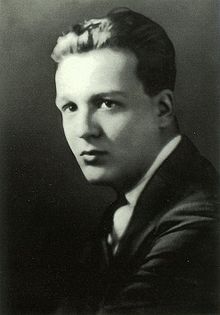
Stanley Grauman Weinbaum (April 4, 1902 – December 14, 1935) was an American science fiction writer. His first story, "A Martian Odyssey", was published to great acclaim in July 1934; the alien Tweel was arguably the first character to satisfy John W. Campbell's challenge: "Write me a creature who thinks as well as a man, or better than a man, but not like a man." Weinbaum wrote more short stories and a few novels, but died from lung cancer less than a year and a half later. (Full article...)
Brian Wilson Aldiss OBE (/ˈɔːldɪs/; 18 August 1925 – 19 August 2017) was an English writer, artist and anthology editor, best known for science fiction novels and short stories. His byline reads either Brian W. Aldiss or simply Brian Aldiss, except for occasional pseudonyms during the mid-1960s.
Greatly influenced by science fiction pioneer H. G. Wells, Aldiss was a vice-president of the international H. G. Wells Society. He was (with Harry Harrison) co-president of the Birmingham Science Fiction Group. Aldiss was named a Grand Master by the Science Fiction Writers of America in 1999 and inducted by the Science Fiction Hall of Fame in 2004. He received two Hugo Awards, one Nebula Award and one John W. Campbell Memorial Award. He wrote the short story "Supertoys Last All Summer Long" (1969), the basis for the Stanley Kubrick-developed Steven Spielberg film A.I. Artificial Intelligence (2001). Aldiss was associated with the British New Wave of science fiction. (Full article...)
Doris May Lessing CH OMG (née Tayler; 22 October 1919 – 17 November 2013) was a British novelist. She was born to British parents in Iran, where she lived until 1925. Her family then moved to Southern Rhodesia (now Zimbabwe), where she remained until moving in 1949 to London, England. Her novels include The Grass Is Singing (1950), the sequence of five novels collectively called Children of Violence (1952–1969), The Golden Notebook (1962), The Good Terrorist (1985), and five novels collectively known as Canopus in Argos: Archives (1979–1983).
Lessing was awarded the 2007 Nobel Prize in Literature. In awarding the prize, the Swedish Academy described her as "that epicist of the female experience, who with scepticism, fire and visionary power has subjected a divided civilisation to scrutiny". Lessing was the oldest person ever to receive the Nobel Prize in Literature, at age 87. (Full article...)

Octavia Estelle Butler (June 22, 1947 – February 24, 2006) was an American science fiction writer who won several awards for her works, including Hugo, Locus, and Nebula awards. In 1995, Butler became the first science-fiction writer to receive a MacArthur Fellowship.
Born in Pasadena, California, Butler was raised by her widowed mother. She was extremely shy as a child, but Butler found an outlet at the library reading fantasy, and in writing. She began writing science fiction as a teenager. Butler attended community college during the Black Power movement in the 1960s. While participating in a local writer's workshop, she was encouraged to attend the Clarion Workshop which focused on science fiction. She sold her first stories soon after, and by the late 1970s had become sufficiently successful as an author to be able to write full-time. (Full article...)
Franklin Patrick Herbert Jr. (October 8, 1920 – February 11, 1986) was an American science-fiction author, best known for his 1965 novel Dune and its five sequels. He also wrote short stories and worked as a newspaper journalist, photographer, book reviewer, ecological consultant, and lecturer.
Dune is the best-selling science fiction novel of all time, and the series is a classic of the science-fiction genre. The Dune saga, set in the distant future and taking place over millennia, explores complex themes, such as the long-term survival of the human species, human evolution, planetary science and ecology, and the intersection of religion, politics, economics, sex, and power in a future where humanity has long since developed interstellar travel and colonized many thousands of worlds. (Full article...)
Vernor Steffen Vinge (/ˈvɜːrnər ˈvɪndʒiː/ ⓘ; October 2, 1944 – March 20, 2024) was an American science fiction author and professor. He taught mathematics and computer science at San Diego State University. He was the first wide-scale popularizer of the technological singularity concept and among the first authors to present a fictional "cyberspace". He won the Hugo Award for his novels A Fire Upon the Deep (1992), A Deepness in the Sky (1999), and Rainbows End (2006), and novellas Fast Times at Fairmont High (2001) and The Cookie Monster (2004). (Full article...)
Neal Town Stephenson (born October 31, 1959) is an American writer known for his works of speculative fiction. His novels have been categorized as science fiction, historical fiction, cyberpunk and baroque.
Stephenson's work explores mathematics, cryptography, linguistics, philosophy, currency, and the history of science. He also writes non-fiction articles about technology in publications such as Wired. He has written novels with his uncle, George Jewsbury ("J. Frederick George"), under the collective pseudonym Stephen Bury. (Full article...)
Algirdas Jonas "Algis" Budrys (January 9, 1931 – June 9, 2008) was a Lithuanian-American science fiction author, editor and critic. He was also known under the pen names Frank Mason, Alger Rome in collaboration with Jerome Bixby, John A. Sentry, William Scarff and Paul Janvier. In the 1990s he was the publisher and editor of the science fiction magazine Tomorrow Speculative Fiction. (Full article...)
Frederik George Pohl Jr. (/poʊl/; November 26, 1919 – September 2, 2013) was an American science-fiction writer, editor, and fan, with a career spanning nearly 75 years—from his first published work, the 1937 poem "Elegy to a Dead Satellite: Luna", to the 2011 novel All the Lives He Led.
From about 1959 until 1969, Pohl edited Galaxy and its sister magazine If; the latter won three successive annual Hugo Awards as the year's best professional magazine. His 1977 novel Gateway won four "year's best novel" awards: the Hugo voted by convention participants, the Locus voted by magazine subscribers, the Nebula voted by American science-fiction writers, and the juried academic John W. Campbell Memorial Award. He won the Campbell Memorial Award again for the 1984 collection of novellas The Years of the City, one of two repeat winners during the first 40 years. For his 1979 novel Jem, Pohl won a U.S. National Book Award in the one-year category Science Fiction, and it was a finalist for three other year's best novel awards. He won four Hugo and three Nebula Awards, including receiving both for the 1977 novel Gateway. (Full article...)
Lester del Rey (June 2, 1915 – May 10, 1993) was an American science fiction author and editor. He was the author of many books in the juvenile Winston Science Fiction series, and the fantasy editor at Del Rey Books, the fantasy and science fiction imprint of Ballantine Books, subsequently Random House, working for his fourth wife Judy-Lynn del Rey’s imprint, Del Rey. (Full article...)
Philip José Farmer (January 26, 1918 – February 25, 2009) was an American author known for his science fiction and fantasy novels and short stories.
Farmer is best known for two sequences of novels, the World of Tiers (1965–93) and Riverworld (1971–83) series. He is noted for the pioneering use of sexual and religious themes in his work, his fascination for, and reworking of, the lore of celebrated pulp heroes, and occasional tongue-in-cheek pseudonymous works written as if by fictional characters. Farmer often mixed real and classic fictional characters and worlds and real and fake authors as epitomized by his Wold Newton family books, which tie classic fictional characters together as real people and blood relatives resulting from an alien conspiracy. Such works as The Other Log of Phileas Fogg (1973) and Doc Savage: His Apocalyptic Life (1973) are early examples of literary mashup novels. (Full article...)

John Wyndham Parkes Lucas Beynon Harris (/ˈwɪndəm/; 10 July 1903 – 11 March 1969) was an English science fiction writer best known for his works published under the pen name John Wyndham, although he also used other combinations of his names, such as John Beynon and Lucas Parkes. Some of his works were set in post-apocalyptic landscapes. His best known works include The Day of the Triffids (1951), filmed in 1962, and The Midwich Cuckoos (1957), which was filmed in 1960 as Village of the Damned, in 1995 under the same title, and again in 2022 in Sky Max under its original title. (Full article...)
James Edwin Gunn (July 12, 1923 – December 23, 2020) was an American science fiction writer, editor, scholar, and anthologist. His work as an editor of anthologies includes the six-volume Road to Science Fiction series. He won the Hugo Award for "Best Related Work" in 1983 and he won or was nominated for several other awards for his non-fiction works in the field of science fiction studies. The Science Fiction and Fantasy Writers of America made him its 24th Grand Master in 2007, and he was inducted by the Science Fiction and Fantasy Hall of Fame in 2015. His novel The Immortals was adapted into a 1970–71 TV series starring Christopher George.
Gunn was a professor emeritus of English and the founding director of the Center for the Study of Science Fiction, both at the University of Kansas. (Full article...)
Zenna Chlarson Henderson (November 1, 1917 – May 11, 1983) was an American elementary school teacher and science fiction and fantasy author. Her first story was published in The Magazine of Fantasy & Science Fiction in 1951. Her work is cited as pre-feminist, often featuring middle-aged women, children, and their relationships, but with stereotyped gender roles. Many of her stories center around human aliens called "The People", who have special powers. Henderson was nominated for a Hugo Award in 1959 for her novelette Captivity. Science fiction authors Lois McMaster Bujold, Orson Scott Card, Connie Willis, Dale Bailey, and Kathy Tyers have cited her as an influence on their work. (Full article...)
Lyon Sprague de Camp (/ˌspreɪɡdəˈkæmp/; November 27, 1907 – November 6, 2000) was an American author of science fiction, fantasy and non-fiction literature. In a career spanning 60 years, he wrote over 100 books, both novels and works of non-fiction, including biographies of other fantasy authors. He was a major figure in science fiction in the 1930s and 1940s. (Full article...)
Samuel Langhorne Clemens (November 30, 1835 – April 21, 1910), known by the pen name Mark Twain, was an American writer, humorist, and essayist. He was praised as the "greatest humorist the United States has produced," with William Faulkner calling him "the father of American literature." Twain's novels include The Adventures of Tom Sawyer (1876) and its sequel, Adventures of Huckleberry Finn (1884), with the latter often called the "Great American Novel." He also wrote A Connecticut Yankee in King Arthur's Court (1889) and Pudd'nhead Wilson (1894) and cowrote The Gilded Age: A Tale of Today (1873) with Charles Dudley Warner. Ernest Hemingway claimed that "All modern American literature comes from one book by Mark Twain called Huckleberry Finn."
Twain was raised in Hannibal, Missouri, which later provided the setting for both Tom Sawyer and Huckleberry Finn. He served an apprenticeship with a printer early in his career, and then worked as a typesetter, contributing articles to his older brother Orion Clemens' newspaper. Twain then became a riverboat pilot on the Mississippi River, which provided him the material for Life on the Mississippi (1883). Soon after, Twain headed west to join Orion in Nevada. He referred humorously to his lack of success at mining, turning to journalism for the Virginia City Territorial Enterprise. (Full article...)
Hans Christian Andersen (/ˈændərsən/ AN-dər-sən; Danish: [ˈhænˀs ˈkʰʁestjæn ˈɑnɐsn̩] ⓘ; 2 April 1805 – 4 August 1875) was a Danish author. Although a prolific writer of plays, travelogues, novels, and poems, he is best remembered for his literary fairy tales.
Andersen's fairy tales, consisting of 156 stories across nine volumes, have been translated into more than 125 languages. They have become embedded in Western collective consciousness, accessible to children as well as presenting lessons of virtue and resilience in the face of adversity for mature readers. His most famous fairy tales include "The Emperor's New Clothes", "The Little Mermaid", "The Nightingale", "The Steadfast Tin Soldier", "The Red Shoes", "The Princess and the Pea", "The Snow Queen", "The Ugly Duckling", "The Little Match Girl", and "Thumbelina." Andersen's stories have inspired ballets, plays, and animated and live-action films. (Full article...)
Béla Ferenc Dezső Blaskó (Hungarian: [ˈbeːlɒ ˈfɛrɛnt͡s ˈdɛʒøː ˈblɒʃkoː]; October 20, 1882 – August 16, 1956), known professionally as Bela Lugosi (/ləˈɡoʊsi/ lə-GOH-see; Hungarian: [ˈluɡoʃi]), was a Hungarian–American actor. He was best remembered for portraying Count Dracula in the horror film classic Dracula (1931), Ygor in Son of Frankenstein (1939) and his roles in many other horror films from 1931 through 1956.
Lugosi began acting on the Hungarian stage in 1902. After playing in 172 productions in his native Hungary, Lugosi moved on to appear in Hungarian silent films in 1917. He had to suddenly emigrate to Germany after the failed Hungarian Communist Revolution of 1919 because of his former socialist activities (organizing a stage actors' union), leaving his first wife in the process. He acted in several films in Weimar Germany, before arriving in New Orleans as a seaman on a merchant ship, then making his way north to New York City and Ellis Island. (Full article...)
Robert Louis Stevenson (born Robert Lewis Balfour Stevenson; 13 November 1850 – 3 December 1894) was a Scottish novelist, essayist, poet and travel writer. He is best known for works such as Treasure Island, Strange Case of Dr Jekyll and Mr Hyde, Kidnapped and A Child's Garden of Verses.
Born and educated in Edinburgh, Stevenson suffered from serious bronchial trouble for much of his life but continued to write prolifically and travel widely in defiance of his poor health. As a young man, he mixed in London literary circles, receiving encouragement from Sidney Colvin, Andrew Lang, Edmund Gosse, Leslie Stephen and W. E. Henley, the last of whom may have provided the model for Long John Silver in Treasure Island. In 1890, he settled in Samoa where, alarmed at increasing European and American influence in the South Sea islands, his writing turned from romance and adventure fiction toward a darker realism. He died of a stroke in his island home in 1894 at age 44. (Full article...)
Charles John Huffam Dickens (/ˈdɪkɪnz/ ⓘ; 7 February 1812 – 9 June 1870) was an English novelist, journalist, short story writer and social critic. He created some of literature's best-known fictional characters, and is regarded by many as the greatest novelist of the Victorian era. His works enjoyed unprecedented popularity during his lifetime and, by the 20th century, critics and scholars had recognised him as a literary genius. His novels and short stories are widely read today.
Born in Portsmouth, Dickens left school at age 12 to work in a boot-blacking factory when his father John was incarcerated in a debtors' prison. After three years, he returned to school before beginning his literary career as a journalist. Dickens edited a weekly journal for 20 years; wrote 15 novels, five novellas, hundreds of short stories and nonfiction articles; lectured and performed readings extensively; was a tireless letter writer; and campaigned vigorously for children's rights, education and other social reforms. (Full article...)
Ursula Kroeber Le Guin (/ˈkroʊbər lə ˈɡwɪn/ KROH-bər lə GWIN; née Kroeber; October 21, 1929 – January 22, 2018) was an American author. She is best known for her works of speculative fiction, including science fiction works set in her Hainish universe, and the Earthsea fantasy series. Her work was first published in 1959, and her literary career spanned nearly sixty years, producing more than twenty novels and over a hundred short stories, in addition to poetry, literary criticism, translations, and children's books. Frequently described as an author of science fiction, Le Guin has also been called a "major voice in American Letters". Le Guin said she would prefer to be known as an "American novelist".
Le Guin was born in Berkeley, California, to author Theodora Kroeber and anthropologist Alfred Louis Kroeber. Having earned a master's degree in French, Le Guin began doctoral studies but abandoned these after her marriage in 1953 to historian Charles Le Guin. She began writing full-time in the late 1950s and achieved major critical and commercial success with A Wizard of Earthsea (1968) and The Left Hand of Darkness (1969), which have been described by Harold Bloom as her masterpieces. For the latter volume, Le Guin won both the Hugo and Nebula awards for best novel, becoming the first woman to do so. Several more works set in Earthsea or the Hainish universe followed; others included books set in the fictional country of Orsinia, several works for children, and many anthologies. (Full article...)

Howard V. Tayler (born February 29, 1968, in Florida) is the creator of the webcomic Schlock Mercenary. He worked as a volunteer missionary for the LDS Church, then graduated from Brigham Young University. Using his degree in music composition, he started an independent record label.
While working at Novell, Tayler began online publication of Schlock Mercenary. He quit his job at Novell several years later in order to work on the webcomic full-time. Schlock Mercenary has been nominated multiple times and won the Web Cartoonists' Choice Awards in two different categories, and the webcomic has been nominated four times for a Hugo Award. (Full article...)
Susanna Mary Clarke (born 1 November 1959) is an English author best known for her debut novel Jonathan Strange & Mr Norrell (2004), a Hugo Award-winning alternative history. Clarke began Jonathan Strange in 1993 and worked on it during her spare time. For the next decade, she published short stories from the Strange universe, but it was not until 2003 that Bloomsbury bought her manuscript and began work on its publication. The novel became a best-seller.
Two years later, she published a collection of her short stories, The Ladies of Grace Adieu and Other Stories (2006). Both Clarke's debut novel and her short stories are set in a magical England and written in a pastiche of the styles of 19th-century writers such as Jane Austen and Charles Dickens. While Strange focuses on the relationship of two men, Jonathan Strange and Gilbert Norrell, the stories in Ladies focus on the power women gain through magic. (Full article...)
Anne Inez McCaffrey (1 April 1926 – 21 November 2011) was an American writer known for the Dragonriders of Pern science fiction series. She was the first woman to win a Hugo Award for fiction (Best Novella, Weyr Search, 1968) and the first to win a Nebula Award (Best Novella, Dragonrider, 1969). Her 1978 novel The White Dragon became one of the first science-fiction books to appear on the New York Times Best Seller list. In 2005 the Science Fiction and Fantasy Writers of America named McCaffrey its 22nd Grand Master, an annual award to living writers of fantasy and science fiction. She was inducted by the Science Fiction Hall of Fame on 17 June 2006. She also received the Robert A. Heinlein Award for her work in 2007. (Full article...)
Poul William Anderson (November 25, 1926 – July 31, 2001) was an American fantasy and science fiction author who was active from the 1940s until his death in 2001. Anderson also wrote historical novels. He won the Hugo Award seven times and the Nebula Award three times, and was nominated many more times for awards. (Full article...)
Peter Soyer Beagle (born April 20, 1939) is an American novelist and screenwriter, especially of fantasy fiction. His best-known work is The Last Unicorn (1968) which Locus subscribers voted the number five "All-Time Best Fantasy Novel" in 1987. During the last twenty-five years he has won several literary awards, including a World Fantasy Award for Life Achievement in 2011. He was named Damon Knight Memorial Grand Master by SFWA in 2018. (Full article...)
Carolyn Janice Cherry (born September 1, 1942), better known by the pen name C. J. Cherryh, is an American writer of speculative fiction. She has written more than 80 books since the mid-1970s, including the Hugo Award–winning novels Downbelow Station (1981) and Cyteen (1988), both set in her Alliance–Union universe, and her Foreigner series. She is known for worldbuilding, depicting fictional realms with great realism supported by vast research in history, language, psychology, and archeology.
Cherryh (pronounced "Cherry") appended a silent "h" to her real name because her first editor, Donald A. Wollheim, felt that "Cherry" sounded too much like a romance writer. She used only her initials, C. J., to disguise that she was female at a time when the majority of science fiction authors were male. (Full article...)
Andre Alice Norton (born Alice Mary Norton, February 17, 1912 – March 17, 2005) was an American writer of science fiction and fantasy, who also wrote works of historical and contemporary fiction. She wrote primarily under the pen name Andre Norton, but also under Andrew North and Allen Weston. She was the first woman to be Gandalf Grand Master of Fantasy, to be SFWA Grand Master, and to be inducted by the Science Fiction and Fantasy Hall of Fame. (Full article...)
Constance Elaine Trimmer Willis (born December 31, 1945), commonly known as Connie Willis, is an American science fiction and fantasy writer. She has won eleven Hugo Awards and seven Nebula Awards for particular works—more major SF awards than any other writer—most recently the "Best Novel" Hugo and Nebula Awards for Blackout/All Clear (2010). She was inducted by the Science Fiction Hall of Fame in 2009 and the Science Fiction Writers of America named her its 28th SFWA Grand Master in 2011.
Several of her works feature time travel by history students at the future University of Oxford, called the Time Travel series or the Oxford Time Travel Series. They are the short story "Fire Watch" (1982, also in several anthologies and the 1985 collection of the same name), the novels Doomsday Book and To Say Nothing of the Dog (1992 and 1997), and the two-part novel Blackout/All Clear (2010). All four won the annual Hugo Award, and Doomsday Book and Blackout/All Clear won both the Hugo and Nebula Awards, making her the first author to win Hugo awards for all books in a series. (Full article...)
Rumiko Takahashi (高橋 留美子, Takahashi Rumiko, born October 10, 1957) is a Japanese manga artist. With a career of several commercially successful works, beginning with Urusei Yatsura in 1978, she is one of Japan's best-known and wealthiest manga artists. Her works are known worldwide, where they have been translated into a variety of languages, with over 230 million copies in circulation; making Takahashi one of the best-selling authors of all time. She has won the Shogakukan Manga Award twice, once in 1980 for Urusei Yatsura and again in 2001 for Inuyasha, and the Seiun Award twice, once in 1987 for Urusei Yatsura and again in 1989 for Mermaid Saga. She also received the Grand Prix de la ville d'Angoulême in 2019, becoming the second woman and second Japanese to win the prize. In 2020, the Japanese government awarded Takahashi the Medal with Purple Ribbon for her contributions to the arts. (Full article...)
Brandon Winn Sanderson (born December 19, 1975) is an American author of high fantasy, science fiction, and young adult books. He is best known for the Cosmere fictional universe, in which most of his fantasy novels, most notably the Mistborn series and The Stormlight Archive, are set. Outside of the Cosmere, he has written several young adult and juvenile series including The Reckoners, the Skyward series, and the Alcatraz series. He is also known for finishing Robert Jordan's high fantasy series The Wheel of Time. Sanderson has created several graphic novel fantasy series, including White Sand and Dark One.
A New York Times best-selling author, Sanderson created Sanderson's Laws of Magic and popularized the idea of "hard magic" and "soft magic" systems. In 2008, Sanderson started a podcast with author Dan Wells and cartoonist Howard Tayler called Writing Excuses, involving topics about creating genre writing and webcomics. In 2016, the American media company DMG Entertainment licensed the movie rights to Sanderson's entire Cosmere universe, but the rights have since reverted back to Sanderson. Sanderson's March 2022 Kickstarter campaign became the most successful in history, finishing with 185,341 backers pledging $41,754,153. (Full article...)
James Oliver Rigney Jr. (October 17, 1948 – September 16, 2007), better known by his pen name Robert Jordan, was an American author of epic fantasy. He is known best for his series The Wheel of Time (finished using Jordan’s notes by Brandon Sanderson after Jordan's death) which comprises 14 books and a prequel novel. He is one of several writers to have written original Conan the Barbarian novels; his are considered by fans to be some of the best of the non-Robert E. Howard efforts. Jordan also published historical fiction using the pseudonym Reagan O'Neal, a western as Jackson O'Reilly, and dance criticism as Chang Lung. Jordan claimed to have ghostwritten an "international thriller" that is still believed to have been written by someone else. (Full article...)
David John Butler is an American speculative fiction author. His epic flintlock fantasy novel Witchy Kingdom won the Dragon Award for Best Alternate History Novel in 2020. Witchy Winter won the 2018 AML Award for Best Novel and the 2018 Whitney Award for Best Speculative Fiction, and Witchy Eye was a preliminary nominee for the Gemmell Morningstar Award. (Full article...)
Larry Correia (/kəˈriː.ə/; born 1977) is an American fantasy and science fiction writer, known for his Monster Hunter International, Grimnoir Chronicles, and Saga of the Forgotten Warrior series. He has authored or co-authored over 30 novels, has over 50 published short works, two collections of stories, and has co-edited four published anthologies.
He was nominated for the John W. Campbell Award for Best New Writer in 2011, and his works have been nominated for the Audie Award multiple times, winning twice. He has won the Dragon Award for Best Military Science Fiction or Best Fantasy Novel four times. In 2014, Correia started the Sad Puppies campaign to nominate works for the Hugo Award, including his own, that he claimed were more popular but often unfairly passed over in favor of more literary works or stories with progressive political themes. (Full article...)
John Michael Scalzi II (born May 10, 1969) is an American science fiction author and former president of the Science Fiction and Fantasy Writers of America. He is best known for his Old Man's War series, three novels of which have been nominated for the Hugo Award, and for his blog Whatever, where he has written on a number of topics since 1998. He won the Hugo Award for Best Fan Writer in 2008 based predominantly on that blog, which he has also used for several charity drives. His novel Redshirts won the 2013 Hugo Award for Best Novel. He has written non-fiction books and columns on diverse topics such as finance, video games, films, astronomy, writing and politics, and served as a creative consultant for the TV series Stargate Universe. (Full article...)
Patrick Joseph McGoohan (/məˈɡuː.ən/; March 19, 1928 – January 13, 2009) was an Irish-American actor of film, television, and theatre. Born in New York City to Irish parents, he was raised in Ireland and England. He began his career in England during the 1950s and became well known for the titular role of secret agent John Drake in the ITC espionage programme Danger Man (1960–1968). He then created, produced, and starred as former British intelligence agent Number Six in the surrealistic ITV series The Prisoner (1967–1968).
Beginning in the 1970s, McGoohan maintained a long-running association with the television series Columbo, writing, directing, producing and appearing in several episodes. His notable film roles included David Jones in Ice Station Zebra (1968); James Stewart, 1st Earl of Moray in Mary, Queen of Scots (1971); the Warden in Escape from Alcatraz (1979); Dr. Paul Ruth in Scanners (1981); Edward I of England in Braveheart (1995); Judge Omar Noose in A Time to Kill (1996); and the voice of Billy Bones in Treasure Planet (2002). (Full article...)
Mário Raul de Morais Andrade (Portuguese pronunciation: [ˈmaɾiu ʁaˈu dʒi moˈɾajs ɐ̃ˈdɾadʒi]; October 9, 1893 – February 25, 1945) was a Brazilian poet, novelist, musicologist, art historian and critic, and photographer. He wrote one of the first and most influential collections of modern Brazilian poetry, Paulicéia Desvairada (Hallucinated City), published in 1922. He has had considerable influence on modern Brazilian literature, and as a scholar and essayist—he was a pioneer of the field of ethnomusicology—his influence has reached far beyond Brazil.
Andrade was a central figure in the avant-garde movement of São Paulo for twenty years. Trained as a musician and best known as a poet and novelist, Andrade was personally involved in virtually every discipline that was connected with São Paulo modernism. His photography and essays on a wide variety of subjects, from history to literature and music, were widely published. He was the driving force behind the Modern Art Week, the 1922 event that reshaped both literature and the visual arts in Brazil, and a member of the avant-garde "Group of Five". The ideas behind the Week were further explored in the preface to his poetry collection Pauliceia Desvairada, and in the poems themselves. (Full article...)
Thomas Nigel Kneale (18 April 1922 – 29 October 2006) was a Manx screenwriter who wrote professionally for more than 50 years, was a winner of the Somerset Maugham Award, and was twice nominated for the BAFTA Award for Best British Screenplay. Predominantly a writer of thrillers that used science-fiction and horror elements, he was best known for the creation of the character Professor Bernard Quatermass. Quatermass was an heroic scientist who appeared in various television, film and radio productions written by Kneale for the BBC, Hammer Film Productions and Thames Television between 1953 and 1996. Kneale wrote original scripts and successfully adapted works by writers such as George Orwell, John Osborne, H. G. Wells and Susan Hill. (Full article...)
Sydney Cecil Newman OC (né Nudelman; April 1, 1917 – October 30, 1997) was a Canadian producer and screenwriter who played a pioneering role in British television drama from the late 1950s to the late 1960s. After his return to Canada in 1970, he was appointed acting director of the Broadcast Programs Branch for the Canadian Radio and Television Commission (CRTC) and then head of the National Film Board of Canada (NFB). He also occupied senior positions at the Canadian Film Development Corporation and Canadian Broadcasting Corporation, and acted as an advisor to the Secretary of State.
During his time in Britain in the 1950s and 1960s, Newman worked first with ABC Weekend TV before moving across to the BBC in 1962, holding the role of Head of Drama with both organisations. During this phase of his career, he created the spy-fi series The Avengers and co-created the science-fiction series Doctor Who, as well as overseeing the production of groundbreaking social realist drama series such as Armchair Theatre and The Wednesday Play. (Full article...)
Abraham "Bram" Stoker (8 November 1847 – 20 April 1912) was an Irish author who is best known for writing the 1897 Gothic horror novel Dracula. During his lifetime, he was better known as the personal assistant of actor Sir Henry Irving and business manager of the West End's Lyceum Theatre, which Irving owned.
In his early years, Stoker worked as a theatre critic for an Irish newspaper and wrote stories as well as commentaries. He also enjoyed travelling, particularly to Cruden Bay in Scotland where he set two of his novels. During another visit to the English coastal town of Whitby, Stoker drew inspiration for writing Dracula. He died on 20 April 1912 due to locomotor ataxia and was cremated in north London. Since his death, his magnum opus Dracula has become one of the best-known works in English literature and the novel has been adapted for numerous films, short stories, and plays. (Full article...)
Ambrose Gwinnett Bierce (June 24, 1842 – c. 1914) was an American short story writer, journalist, poet, and American Civil War veteran. His book The Devil's Dictionary was named one of "The 100 Greatest Masterpieces of American Literature" by the American Revolution Bicentennial Administration. His story "An Occurrence at Owl Creek Bridge" has been described as "one of the most famous and frequently anthologized stories in American literature", and his book Tales of Soldiers and Civilians (also published as In the Midst of Life) was named by the Grolier Club one of the 100 most influential American books printed before 1900.
A prolific and versatile writer, Bierce was regarded as one of the most influential journalists in the United States and as a pioneering writer of realist fiction. For his horror writing, Michael Dirda ranked him alongside Edgar Allan Poe and H. P. Lovecraft. S. T. Joshi speculates that he may well be the greatest satirist America has ever produced, and in this regard can take his place with such figures as Juvenal, Swift, and Voltaire. His war stories influenced Stephen Crane, Ernest Hemingway, and others, and he was considered an influential and feared literary critic. In recent decades, Bierce has gained wider respect as a fabulist and for his poetry. (Full article...)
Robert Albert Bloch (/blɒk/; April 5, 1917 – September 23, 1994) was an American fiction writer, primarily of crime, psychological horror and fantasy, much of which has been dramatized for radio, cinema and television. He also wrote a relatively small amount of science fiction. His writing career lasted 60 years, including more than 30 years in television and film. He began his professional writing career immediately after graduation from high school, aged 17. Best known as the writer of Psycho (1959), the basis for the film of the same name by Alfred Hitchcock, Bloch wrote hundreds of short stories and over 30 novels. He was a protégé of H. P. Lovecraft, who was the first to seriously encourage his talent. However, while he started emulating Lovecraft and his brand of cosmic horror, he later specialized in crime and horror stories working with a more psychological approach.
Bloch was a contributor to pulp magazines such as Weird Tales in his early career, and was also a prolific screenwriter and a major contributor to science fiction fanzines and fandom in general. (Full article...)

Murray Leinster (/ˈlɛnstər/) was a pen name of William Fitzgerald Jenkins (June 16, 1896 – June 8, 1975), an American writer of genre fiction, particularly of science fiction. He wrote and published more than 1,500 short stories and articles, 14 movie scripts, and hundreds of radio scripts and television plays. (Full article...)
Kurt Vonnegut (/ˈvɒnəɡət/ VON-ə-gət; November 11, 1922 – April 11, 2007) was an American author known for his satirical and darkly humorous novels. His published work includes fourteen novels, three short-story collections, five plays, and five nonfiction works over fifty-plus years; further works have been published since his death.
Born and raised in Indianapolis, Vonnegut attended Cornell University, but withdrew in January 1943 and enlisted in the U.S. Army. As part of his training, he studied mechanical engineering at the Carnegie Institute of Technology and the University of Tennessee. He was then deployed to Europe to fight in World War II and was captured by the Germans during the Battle of the Bulge. He was interned in Dresden, where he survived the Allied bombing of the city in a meat locker of the slaughterhouse where he was imprisoned. After the war, he married Jane Marie Cox. He and his wife both attended the University of Chicago while he worked as a night reporter for the City News Bureau. (Full article...)
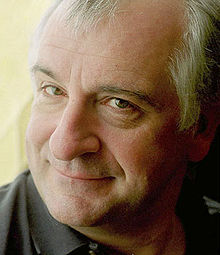
Douglas Noel Adams (11 March 1952 – 11 May 2001) was an English author, humourist, and screenwriter, best known as the creator of The Hitchhiker's Guide to the Galaxy (HHGTTG). Originally a 1978 BBC radio comedy, The Hitchhiker's Guide to the Galaxy developed into a "trilogy" of five books which sold more than 15 million copies in his lifetime. It was further developed into a television series, several stage plays, comics, a video game, and a 2005 feature film. Adams's contribution to UK radio is commemorated in The Radio Academy's Hall of Fame.
Adams also wrote Dirk Gently's Holistic Detective Agency (1987) and The Long Dark Tea-Time of the Soul (1988), and co-wrote The Meaning of Liff (1983), The Deeper Meaning of Liff (1990) and Last Chance to See (1990). He wrote two stories for the television series Doctor Who, including the unaired serial Shada, co-wrote City of Death (1979), and served as script editor for its 17th season. He co-wrote the sketch "Patient Abuse" for the final episode of Monty Python's Flying Circus. A posthumous collection of his selected works, including the first publication of his final (unfinished) novel, was published as The Salmon of Doubt in 2002. (Full article...)
Stephen Russell Davies (/ˈdeɪvɪs/ DAY-vis; born 27 April 1963), known professionally as Russell T Davies, is a Welsh screenwriter and television producer. He is best known for being the original showrunner and head writer of the 2005 revival of the BBC sci-fi series Doctor Who, from 2005 to 2010 and again since 2023. His other notable works include creating the series Queer as Folk (1999–2000), Bob & Rose (2001), The Second Coming (2003), Casanova (2005), Doctor Who spin-offs Torchwood (2006–2011) and The Sarah Jane Adventures (2007–2011), Cucumber (2015), A Very English Scandal (2018), Years and Years (2019), It's a Sin (2021) and Nolly (2023).
Born in Swansea, Davies had aspirations as a comic artist before focusing on being a playwright and screenwriter. After graduating from Oxford University, he joined the BBC's children's department, CBBC, in 1985 on a part-time basis and held various positions, which included creating two series, Dark Season and Century Falls. He eventually left the BBC for Granada Television, and in 1994 began writing adult television drama. His early scripts generally explored concepts of religion and sexuality among various backdrops: Revelations was a soap opera about organised religion and featured a lesbian vicar; Springhill was a soap drama about a Catholic family in contemporary Liverpool; The Grand explored society's opinion of subjects such as prostitution, abortion and homosexuality during the interwar period; and Queer as Folk recreated his experiences in the Manchester gay scene. His work in the 2000s included Bob & Rose, which portrayed a gay man who fell in love with a woman; The Second Coming, which focused on the second coming and deicide of Jesus Christ from a mostly non-religious point of view; Mine All Mine, a comedy about a family who discover they own the entire city of Swansea; and Casanova, an adaptation of the complete memoirs of Venetian adventurer Giacomo Casanova. (Full article...)
Walter Elias Disney (/ˈdɪzni/ DIZ-nee; December 5, 1901 – December 15, 1966) was an American animator, film producer, voice actor, and entrepreneur. A pioneer of the American animation industry, he introduced several developments in the production of cartoons. As a film producer, he holds the record for most Academy Awards earned (22) and nominations (59) by an individual. He was presented with two Golden Globe Special Achievement Awards and an Emmy Award, among other honors. Several of his films are included in the National Film Registry by the Library of Congress and have also been named as some of the greatest films ever by the American Film Institute.
Born in Chicago in 1901, Disney developed an early interest in drawing. He took art classes as a boy and took a job as a commercial illustrator at the age of 18. He moved to California in the early 1920s and set up the Disney Brothers Studio (now The Walt Disney Company) with his brother Roy. With Ub Iwerks, he developed the character Mickey Mouse in 1928, his first highly popular success; he also provided the voice for his creation in the early years. As the studio grew, he became more adventurous, introducing synchronized sound, full-color three-strip Technicolor, feature-length cartoons and technical developments in cameras. The results, seen in features such as Snow White and the Seven Dwarfs (1937), Pinocchio, Fantasia (both 1940), Dumbo (1941), and Bambi (1942), furthered the development of animated film. New animated and live-action films followed after World War II, including the critically successful Cinderella (1950), Sleeping Beauty (1959) and Mary Poppins (1964), the last of which received five Academy Awards. (Full article...)
Robert Earl Kaske (June 1, 1921 – August 8, 1989) was an American professor of medieval literature. He spent most of his career at Cornell University in Ithaca, New York, where he was the Avalon Foundation Professor in the Humanities, and where he founded one of the preeminent medieval studies graduate programs in North America. His published output included lengthy interpretations of Beowulf, and of poems and passages by Dante and Chaucer, and frequently constituted leading studies. Kaske particularly enjoyed solving cruxes, with articles on problematic passages in works such as Pearl, Piers Plowman, the Divine Comedy, "The Husband's Message", "The Descent into Hell", and Beowulf.
Born in Cincinnati and a straight-A student in high school, Kaske studied liberal arts at Xavier University and joined a variety of student literary organizations there. He was a four-year member of the Reserve Officers' Training Corps, and was commissioned a second lieutenant before his 1942 graduation; much of the next four years was spent with the Army in the South Pacific during World War II. While there he read a story about a dusk-to-dawn conversation between two professors and, entranced by the prospect of such intellectual discussions, decided on an academic career. Kaske enrolled in the English literature program at the University of North Carolina at Chapel Hill (UNC) on the back of the G.I. Bill, received his master's in 1947, and his PhD in 1950. (Full article...)
Rodney Stephen Steiger (/ˈstaɪɡər/ STY-gər; April 14, 1925 – July 9, 2002) was an American actor, noted for his portrayal of offbeat, often volatile and crazed characters. Ranked as "one of Hollywood's most charismatic and dynamic stars", he is closely associated with the art of method acting, embodying the characters he played, which at times led to clashes with directors and co-stars. He starred as Marlon Brando's mobster brother Charley in On the Waterfront (1954), the title character Sol Nazerman in The Pawnbroker (1964) which won him the Silver Bear for Best Actor, and as police chief Bill Gillespie opposite Sidney Poitier in the film In the Heat of the Night (1967) which won him the Academy Award for Best Actor.
Steiger was born in Westhampton, New York, the son of a vaudevillian. He had a difficult childhood, running away from home to escape an alcoholic mother at the age of 16. After serving in the South Pacific during World War II, he began his acting career with television roles in 1947, and went on to garner critical acclaim for his portrayal of the main character in the teleplay "Marty" (1953). He made his stage debut in 1946, in a production of Curse you, Jack Dalton! at the Civic Repertory Theatre of Newark, and subsequently appeared in productions such as An Enemy of the People (1950), Clifford Odets's Night Music (1951), Seagulls Over Sorrento (1952), and Rashomon (1959). (Full article...)
Sir Christopher Edward Nolan (born 30 July 1970) is a British and American filmmaker. Known for his Hollywood blockbusters with complex storytelling, he is considered a leading filmmaker of the 21st century. Nolan's films have earned over $6.6 billion worldwide, making him the seventh-highest-grossing film director of all time. His accolades include two Academy Awards, a Golden Globe Award and two British Academy Film Awards. Nolan was appointed a Commander of the Order of the British Empire in 2019, and received a knighthood in 2024 for his contributions to film.
Nolan developed an interest in filmmaking from a young age. After studying English literature at University College London, he made several short films before his feature film debut with Following (1998). Nolan gained international recognition with his second film, Memento (2000), and transitioned into studio filmmaking with Insomnia (2002). He became a high-profile director with The Dark Knight trilogy (2005–2012), and found further success with The Prestige (2006), Inception (2010), Interstellar (2014), and Dunkirk (2017). After the release of Tenet (2020), Nolan parted ways with longtime distributor Warner Bros. Pictures, and signed with Universal Pictures for the biographical thriller Oppenheimer (2023), which won him Academy Awards for Best Director and Best Picture. (Full article...)
Thomas Stanley Holland (born 1 June 1996) is an English actor. His accolades include a BAFTA Award. He featured on the Forbes 30 Under 30 Europe list of 2019. Some publications have called him one of the most popular actors of his generation.
Holland's career began at the age of nine, when he enrolled in a dancing class, where a choreographer noticed him and arranged for him to audition for a role in Billy Elliot the Musical at London's Victoria Palace Theatre. After two years of training, he secured a supporting part in 2008 and was upgraded to the title role that year, which he played until 2010. Holland made his film debut in the disaster drama The Impossible (2012) as a teenage tourist trapped in a tsunami, for which he received critical acclaim and a nomination for the Goya Award for Best New Actor. After this, Holland decided to pursue acting as a full-time career, appearing in How I Live Now (2013) and playing historical figures in the film In the Heart of the Sea (2015) and the miniseries Wolf Hall (2015). (Full article...)

Colin Robert Chase (February 5, 1935 – October 13, 1984) was an American academic. An associate professor of English at the University of Toronto, he was known for his contributions to the studies of Old English and Anglo-Latin literature. His best-known work, The Dating of Beowulf, challenged the accepted orthodoxy of the dating of the Anglo-Saxon poem Beowulf—then thought to be from the latter half of the eighth century—and left behind what was described in A Beowulf Handbook as "a cautious and necessary incertitude".
Born in Denver, Chase was one of three sons of a newspaper executive and a Pulitzer Prize-winning playwright, Mary Coyle Chase. Chase's two brothers became actors; he considered such a career, but ultimately studied English literature, classics, and philosophy. He received his Bachelor of Arts from Harvard University, Master of Arts from Saint Louis and Johns Hopkins Universities, and Ph.D. from the University of Toronto in 1971, the same year the university named him an assistant professor. (Full article...)


